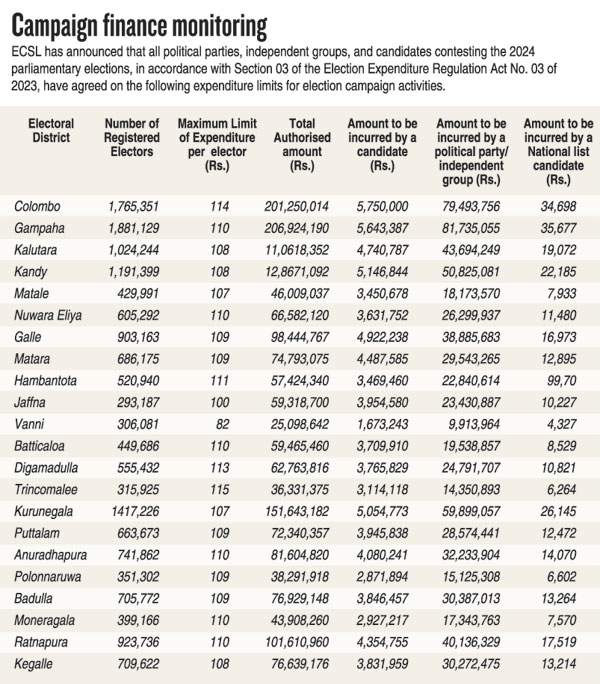News
Parties, candidates agree to EC’s campaign finance limits
View(s):By Tharushi Weerasinghe
Parties, candidates, and independent groups contesting the November 14 parliamentary elections have agreed to stick by the campaign expenditure limits set by the Election Commission in consultation with stakeholders, officials said.
In a circular released last week, the Election Commission set out the regulations governing the spending, recording and reporting of campaign finances for this election.
According to the Election Expenditure Act No. 3 2023, candidates must submit a report detailing all election campaign expenses within 21 days following the announcement of election results. This report must also include donations or contributions made on behalf of the candidate, with an estimated value for in-kind contributions. Additionally, the nature of these contributions must be specified, indicating whether they were provided as gifts, loans, advances, or deposits.

The limits per voter vary according to electoral districts, with the lowest limit, Rs. 82, in Vanni and the highest, Rs. 115, in Trincomalee. The electoral district with the highest overall expenditure limit is Gampaha, at Rs. 206,924,190.
Election Commission Chairman R.M.A.L. Rathnayake said the limits were determined through a formula that considered factors such as land area, population, the number of voters, authorised expenses, and requests from candidates. This total was divided among the candidates, political parties, and national list candidates. Sixty percent of the spending limit is attributable to the district-level candidates, 39.5% of the total amount is allocated to the political party or independent groups, and 0.5% is allocated to the National List candidates.
“We consulted the candidates before the limits were set under the relevant regulations and to avoid any issues further down the line,” he said, adding that monitoring would be similar to the methods followed during the presidential election in September. Candidates will be able to hand over their submissions to the respective district secretariat or the district Election Commission office.
In a pre-election interim report, the People’s Actions for Free and Fair Elections (PAFFREL) on Friday noted that several election monitors, including the Centre for Monitoring Election Violence (CMEV), the Transparency International Sri Lanka (TISL), the Hashtag Generation, Campaign for Free and Fair Elections (CaFFE), and the Institute for Democratic Reforms & Electoral Studies (IRES), have set up campaign finance monitoring mechanisms to ensure that candidates adhere to the prescribed limits. Districts have been allocated between the various monitors, with designated officers keeping track of rallies, meetings, and other related expenses.
PAFFREL said it would monitor the campaign finance activities of the Samagi Jana Balawegaya (SJB), the National People’s Power (NPP), the Sri Lanka Podujana Peramuna (SLPP), the New Democratic Front (NDF), the Sarvajana Balaya, the United Democratic Voice, and other parties.
The monitoring activities would be supported by the Chanda Salli Meetare website, a tool designed to enhance the capabilities of Sri Lanka’s election monitoring groups.
The best way to say that you found the home of your dreams is by finding it on Hitad.lk. We have listings for apartments for sale or rent in Sri Lanka, no matter what locale you're looking for! Whether you live in Colombo, Galle, Kandy, Matara, Jaffna and more - we've got them all!

